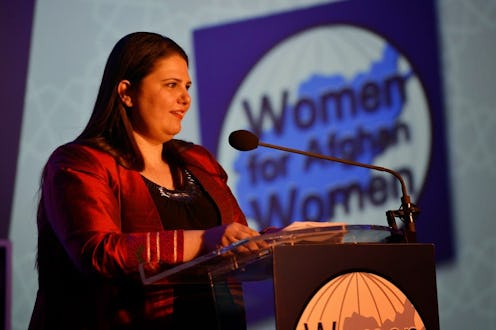News
Threats From The Taliban Won't Stop Her Fighting

Even threats from the Taliban aren't enough to stop Manizha Naderi from fighting for women's rights in Afghanistan. "We receive threats every day," Naderi tells Bustle in a phone interview. "Not just myself, but also our province managers, our aid workers, and our lawyers. It's a daily occurrence for us."
Naderi is the Executive Director of Women for Afghan Women (WAW), an aid organization with offices in New York, D.C., and Kabul that works to protect vulnerable women and girls in the war-torn country. In addition to emergency and long-term shelters for victims of violence, WAW operates legal aid centers and conducts human rights training for law enforcement officials, religious leaders, and community members.
The organization has provided assistance to women like Bibi Aisha, who captured international media attention when her husband and in-laws sliced off her ears and nose after she fled their abusive home. Gul Meena, a Pakistani victim of a horrific attempted honor killing, also benefited from WAW's care and services.
Growing up in the United States, Naderi, 39, had no memory of her home country. She fled Afghanistan with her family at the age of three after the Soviet invasion, and was raised in New York. However, despite the geographic distance, she felt connected to her birthplace and a desire to help fellow Afghan women. In 2002, she joined WAW as a volunteer. Today, she oversees 650 staff members who work in 13 provinces throughout Afghanistan, and also manages the organization's facilities in the States.
In 2003, Naderi returned to Afghanistan for the first time since she had left as a child. "It was a war-torn country, where communications and the Internet were just getting off the ground," she says. "Everything was really difficult for everyone."
Today, WAW has 32 facilities throughout the country, including transitional houses, which offer vocational and financial literacy skills classes, as well as job placement assistance. For abused women who cannot return to their families, such services help them to stand on their own. "Our goal is to help women reintegrate into society," says Naderi.
Compared with the Afghanistan that she encountered during her first trip home in 2003, Naderi says today's Afghanistan is unrecognizable. "It is a different country," she says. "The roads are paved, everyone has Internet, there are millions of girls going to school ... There are more women in parliament."
However, Naderi agrees that deeply-ingrained cultural attitudes that perpetuate inequality and condones violence against women and girls remain one of the biggest obstacles facing Afghan women. She acknowledges that although positive changes have taken root in the country, they have been gradual.
"Cultural change doesn't happen overnight," she says. "We have made a lot of progress, and things are changing, but they are changing slowly."
She stresses the importance of educating boys and men about women's rights, so that rather than perpetrators of violence, they can become a part of the solution. "If both boys and girls are educated, their children will be educated. Education changes everything."
Naderi hopes to eventually operate shelters and family guidance centers in all of the country's 34 provinces. In the meantime, she continues to travel between New York and Afghanistan, where the thousands of women WAW has helped drive her to move forward with the organization's work, despite the risks.
"We're saving women's lives," she says. "Dozens and dozens of women would be dead if our shelters didn't exist."
Images: Women for Afghan Women, Getty Images